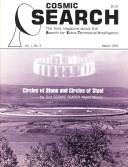![[NAAPO Logo]](../../Images/NAAPOsm.jpg) North American AstroPhysical Observatory (NAAPO)
|
|
A Single Vote
An Historical Fable by Sedgewick Seti
Hans Christian Oersted lived in Denmark. One day in 1819 he connected a wire to a new galvanic cell he had acquired. A compass happened to be lying near the wire and Oersted noticed that its needle moved. When he disconnected the wire the needle returned to its normal position. Oersted was intrigued. The experiment suggested to him that the current in the wire produced some kind of force which
affected the compass needle. This could be important, he thought, and more work should be done so he prepared a proposal for a research grant to study the effect further.
In due time his proposal for 100 kroner came before his country's august Parliament for consideration. Lord Allsen spoke out forcefully against Oersted's proposal. It would be a waste of the taxpayers' money, he pointed out, to spend even one pence to find out more about what a wire would do to a compass. What was needed, he said, was more practical research like developing longer burning, brighter candles that didn't need their wicks trimmed as often or breeding faster horses so that messages could be carried between cities more swiftly. Lord Allsen promised to do all he could to support research for better candles and faster horses.
Others spoke against Oersted's proposal but finally Lord Bensen was recognized by the King who was presiding over the Parliament. Lord Bensen explained that what Oersted had discovered might be just a beginning, the first insight into other effects, and although he could not foresee what these might be, they could lead to developments of considerable value. Oersted was an explorer like Columbus or
Magellan; his finding was something new and he should be spported, Lord Bensen pleaded.
A lively discussion followed, much of it in acrimonious exchanges between supporters and opponents of the proposal. Finally, the King rapped his gavel to end the discussion and call for a vote. It was very close, but Oersted's proposal carried by a single vote.
Backed by the grant, Oersted extended his research and this led to further work by Faraday, Maxwell, Hertz, Edison and many others so that today we have electric motors, generators, and lights, the telegraph and telephone, radio, television, electronic computers and a host of other devices. It is interesting to speculate that if Lord Allsen and other Lord Allsens had had their way we might enjoy none of these today, the world would have been spared the blight of everything electrical but we might have better candles and horses so fast that, working in relays, a message could reach Chicago from New York in no more than 3 days.
|
